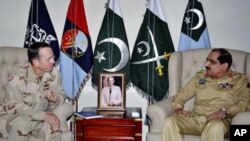The chairman of the Joint Chiefs of Staff, America’s top military officer, is in Afghanistan and Pakistan this week for high-level meetings regarding the future of the military conflict in the region as well as anti-terrorism efforts.
Admiral Michael Mullen’s visit comes at a crucial time for both the war in Afghanistan and the relationship between Islamabad and Washington, which has become seriously frayed over the last few months.
Pakistan’s relations with the United States are complex, involving issues that go well beyond the war across the Pakistani border. But the conflict in Afghanistan is central to the partnership, primarily because of the extremists from Afghanistan who find refuge in Pakistan's lawless frontier territories and the U.S. efforts to deny those militants Pakistani safe havens.
Two aspects of the U.S. counterinsurgency campaign - the presence of CIA operatives in Pakistan and the use of drones to strike insurgents hiding inside Pakistan’s territory - have deeply angered the people of Pakistan.
The U.S. has been frustrated by Pakistan's reluctance to go after the militant groups in the country's northwest. It is also unhappy about the continued covert support to certain armed networks, such as the Haqqani group, provided by elements of Pakistan’s intelligence agency, the ISI.
Speaking to Pakistani media, Admiral Mullen said support for the Haqqani network has to stop. "The Haqqani network very specifically facilitates and supports the Taliban who move into Afghanistan and are killing Americans. And I cannot accept that. And I will do everything I possibly can to prevent that, specifically. The ISI has a long standing relationship with the Haqqani network. That doesn't mean everybody in the ISI, but it's there," he said.
Admiral Mullen went on to say that in the past the use of the certain militant groups has been in the interest of Pakistan’s military - alluding to the use of these groups against Pakistan’s traditional enemy, India. The admiral said he understood that the primary role of Pakistan's military is to protect the country's interests, but he reiterated that the support for these groups must end.
The admiral also said he discussed the issue of drone strikes with Pakistan's Army Chief Ashfaq Kayani but made no comment to reporters as to whether or not the United States will continue its campaign against militants in Pakistan's tribal region.
Retired Pakistani General Talat Masood says there is an understanding on the Pakistani side that the drones strikes should continue. But he says there must be a change in the way the strikes are carried out:
"Both of them [Pakistan and the U.S.] have to look at it in a somewhat more nuanced way. And by nuanced, I really mean [that] even if it has to continue by the U.S., it has to be done in such a way that it has to have some sort of an acceptance, and coordination and cooperation with Pakistan. We must reduce any collateral damage," he said.
Masood says that despite these differences and controversies, both sides agree that the relationship remains vital and cannot be discarded.
While in Pakistan, Admiral Mullen will hold extensive talks with both civilian and military leaders, and also debrief U.S. representatives. It is his 22nd trip to the country since becoming Joint Chiefs of Staff chairman and is unlikely to be his last before he retires later this year.
US: Pakistan ISI Has Links with Militants




